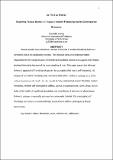As thick as thieves : exploring Thomas Hobbes' critique of ancient friendship and its contemporary relevance
Abstract
Recent decades have witnessed a revival of interest in ancient friendship both as a normative and as an explanatory concept. The literature concurs in holding Hobbes responsible for the marginalisation of friendship in political science and suggests that Hobbes devalued friendship because of his understanding of man. The paper argues that while Hobbes's account and appraisal of friendship hinge on his assumption that man is self-interested, his critique of normative friendship does not rest on that notion. Hobbes's challenge is that, deprived of its classical foundation in a 'truth' (the 'good life'), modern friendship, whether self-interested or selfless, cannot be assumed to be a civic virtue, nor an index of the health of a political association, nor a facilitator of domestic or global peace. Hobbes's critique is especially relevant for writers who maintain that a resurgence of friendship can nurture concord and foster reconciliation in contemporary liberal democracies.
Citation
Slomp , G 2019 , ' As thick as thieves : exploring Thomas Hobbes' critique of ancient friendship and its contemporary relevance ' , Political Studies , vol. 67 , no. 1 , pp. 191-206 . https://doi.org/10.1177/0032321718761243
Publication
Political Studies
Status
Peer reviewed
ISSN
0032-3217Type
Journal article
Collections
Items in the St Andrews Research Repository are protected by copyright, with all rights reserved, unless otherwise indicated.

